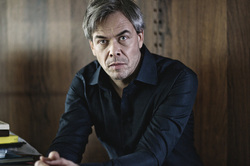
What’s Finland known for? The sauna? Or perhaps Nokia phones?
The best-known Finnish conductor these days is probably Esa-Pekka Salonen, who led the Los Angeles Philharmonic from 1992 to 2009. But in the last two decades, Finnish conductors have been placed at the head of orchestras in London, Glasgow, Cologne, Copenhagen, Stockholm, Brussels, Minneapolis, Toronto, Tokyo – the list goes on.
One Finnish conductor who’s been turning heads is Hannu Lintu. The Washington Post has praised his “exuberance and big gestures,” and the Chicago Tribune called him “immensely assured on the podium.”
Lintu lives in Helsinki, and his recent appointment as music director of the Finnish Radio Orchestra keeps him on home turf, at least some of the time.
However, for many years Lintu has maintained a busy touring schedule. This season, he’s guest-conducting orchestras from London to Sydney – and his U.S. engagements have already taken him to St. Louis, Baltimore, and Portland, Oregon.
Houston is next – and he’ll return to Jones Hall on Friday, Saturday and Sunday. The dynamic 45-year-old maestro will lead the Houston Symphony in a program of works by Ralph Vaughan Williams, William Walton and Joseph Haydn.
Lintu’s busy career has given him a global perspective on classical music. He candidly shared his thoughts last weekend, in an interview from Portland.
Q: Why is classical music so highly valued and successful in Finland?
A: There are several reasons – and one of them is historical. When Finland wanted to be come independent from Russia in the First World War, music was an important channel for people to express their feelings about their country. They couldn’t do it verbally, because of the censorship.
Another reason is the music school system, which was established in the early 1970s. Every village has a music school, then there are 12 larger conservatories, and finally the Sibelius Academy in Helsinki. So it’s like a pyramid – and the exam system is pretty strict in these schools.
That is why we have so many internationally acclaimed musicians. The system finds the kids with the most potential, from even the remotest corner of the country. But this system is now in danger because of the economic situation. I hope we can save it.
Q: And how would you compare classical music in the U.S. and Europe?
A: The function of a symphony orchestra is a little bit different in America than it is in Europe. In America, it’s more about entertainment. European orchestras usually give their concerts in the middle of the week, whereas in America the concerts are usually on the weekend. This means that American orchestras have to compete with other weekend activities, like movies, or sports, or anything families do together.
Also, in America a music director must be part of the community, and part of the orchestra’s fundraising machinery. That is something you don’t have to do in Europe. That’s why some European conductors don’t want a position in America – because they’re used to a different kind of system.
And the tradition of going to concerts is more established in Europe. In places like Russia or Germany, people feel that classical concerts are a kind of nourishment that they need to live. But I don’t want to say that there aren’t such people in America, also.
Q: It seems that all roads to a conducting career in Finland lead to the doorstep of one special teacher: Jorma Panula, at the Sibelius Academy. Most Finnish conductors studied with him, including you. What was it like?
A: Panula’s greatest talent is to create an atmosphere in which people can learn from themselves and each other. He wanted us to express ourselves exactly as we wished. So if you compare Finnish conductors, you’ll see we’re not the same.
He’s kind of a zen teacher – a Yoda, I would say. One of his greatest talents is that he always picked the right people from the auditions. He has a kind of X-ray vision, and he can see immediately which candidates are going to become good conductors.
Q: Some people say that conductors travel too much these days. Certainly, you travel a lot – do you think this is a problem?
A: If you travel a lot, you know how to take care of jetlag. You know how to sleep, and prepare for long flights. I have colleagues who don’t like to travel – but I like hotels and airplanes. However, I’m going to reduce my traveling because I have a great job in Helsinki now, which is my home town.
I’d like the world to go back to the time when music directors spent most of their time with their own orchestras. But traveling will always be part of conducting, because the orchestras don’t travel to us – we have to travel to them.
Q: You’ve conducted the Houston Symphony several times. What’s your opinion of the stature of this orchestra in the world?
A: There are some American orchestras that are not known in Europe. I don’t want to mention any names – but the fact that they aren’t known outside America is a sign that they aren’t really international orchestras.
However, the Houston Symphony is one of the American orchestras that’s well known. It’s known as an orchestra that’s at a very high level.
Q: What do you do when you’re not conducting?
A: For most musicians, music starts as a hobby, and then it becomes a profession. So I don’t really need any other hobbies. I don’t collect stamps, or play golf. But I do read a lot, because that’s something I can do while I’m traveling.
© Colin Eatock 2013
 RSS Feed
RSS Feed

